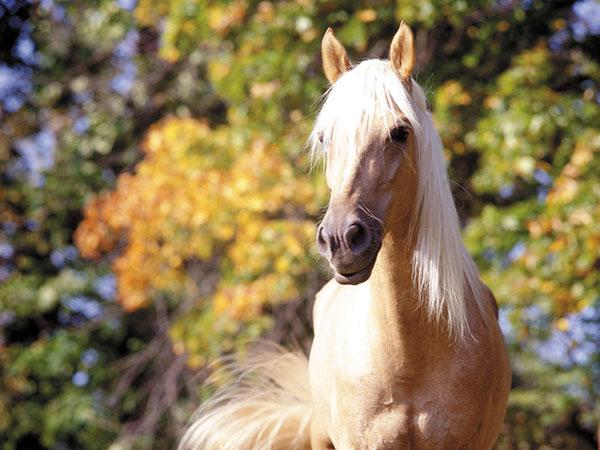
Cooler Weather and Horses
Wednesday, November 1, 2017
Cooler weather can be ideal horseback riding weather. Nothing like a cool day to energize ourselves and decrease the bugs to make it a perfect day for a good ride.
As cooler days increase, here are some tips to prepare your horse and its environment.
Monitor your pastures. If you have adequate acreage, take horses off specific areas to allow the grasses themselves to prepare for winter. Leaving some height/leaf on the grasses allows them to store nutrients.
Shorter days and cooler weather reduces the growth of grasses. The first hard frost makes grasses go dormant. If you allow your horses to overgraze the field, the grasses will have a tougher time remerging next spring.
If your veterinarian has diagnosed your horses with insulin resistance, equine metabolic syndrome, or laminitis, controlling intake of fall grasses is important. Follow your veterinarian’s advice and consider using a muzzle to control intake. Fall grasses stressed by weather changes can experience a rise in sugars or nonstructural carbohydrates that can be a risk for horses with those diseases.
Horses with teeth problems can manage fairly well on a diet of fresh grass. As the availability of grass decreases and horses must rely on hay or other preserved forage, their need for well-functioning teeth increases. Have your veterinarian check your horse’s teeth and float them if necessary.
Providing clean fresh water is essential for the health of your horses. Fresh grass is a good source of water but as your horse comes to rely on hay or other preserved forage, their need for water increases. Consider investing in a stock tank heater or heated water buckets. Ideal water temperature for consumption is between 45-65° Fahrenheit.
There is never enough salt in grass or hay. Ensure that horses have access to salt in block or loose form year round. Adding loose salt to the grain ration has the added benefit of increasing water consumption.
Many horses can maintain their ideal body condition score (BCS) on grass alone during the warmer months. As the temperature falls, horses must use more calories to stay warm. Some horses can simply consume more hay to maintain their BCS. Review your horse’s diet with a qualified nutritionist. They may suggest adding nutrient dense calories in a prepared grain ration to help your horse maintain their BCS.
Most healthy horses do not require a blanket during the winter. If you continue to compete or work your horse hard during the colder months, you may consider clipping some or all of their dense winter coat. Clipped horses must be monitored at least twice a day and blanketed to help them stay warm.
The challenge with clipped horses are the days that begin below freezing and then warm up during the day. The blanket that keeps them warm at night may contribute to sweating during the day. Sweaty horses will rub their blankets and be uncomfortable.
The same shelter that protects horses from the heat of the sun in summer can provide shelter from wind, rain and snow in the winter. Check your shelter for any needed maintenance as horses can busy themselves with chewing and rubbing against the structure.
Review your parasite control program along with your vaccine program. The program you follow with your horse can change due to competition schedules, age, and grazing options.
Remember that older horses are the ones that often find winter to be the most challenging. They tend to have more problems with their teeth and their caloric demands to stay warm must be taken into account. Consider soaking roughages (hay, cubes and beet pulp) to provide water and a bit easier digestion. Your nutritionist may also suggest a senior concentrate feed.
As always, consult your veterinarian for the best advice on keeping your horse healthy.
by Elisabeth J. Giedt, DVM
Veterinary Viewpoints is provided by the faculty of the OSU Veterinary Medical Hospital. Certified by the American Animal Hospital Association, the hospital is open to the public providing routine and specialized care for all species and 24-hour emergency care, 365 days a year.
